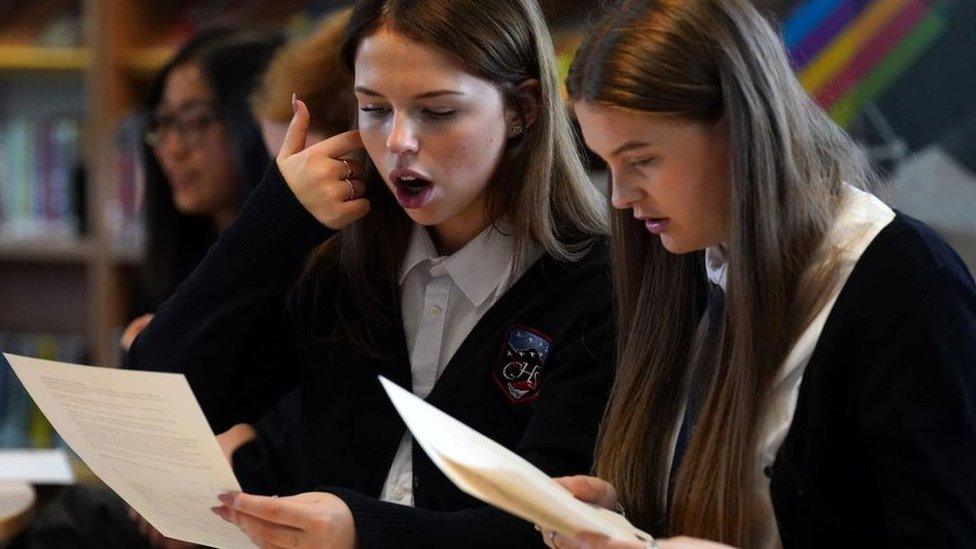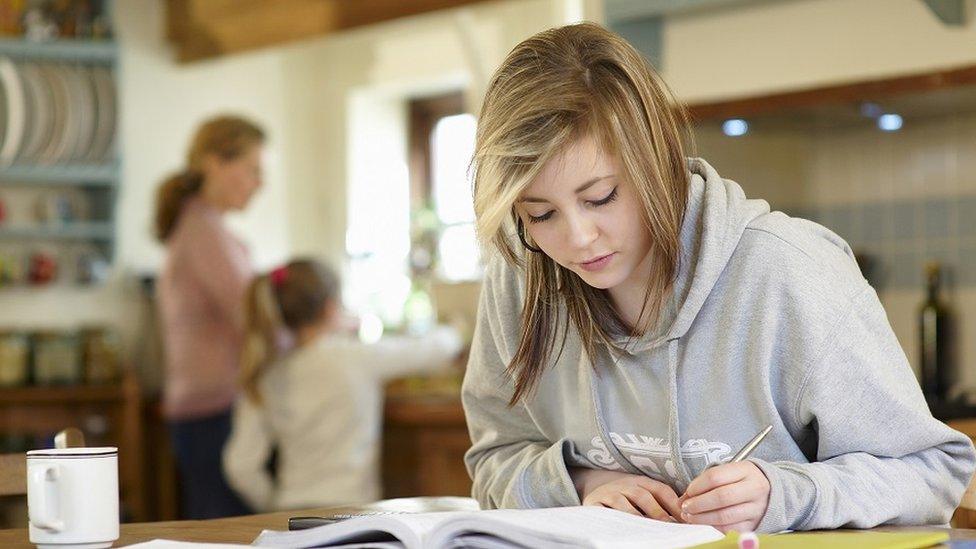GCSE English and maths resits to rise by thousands
- Published
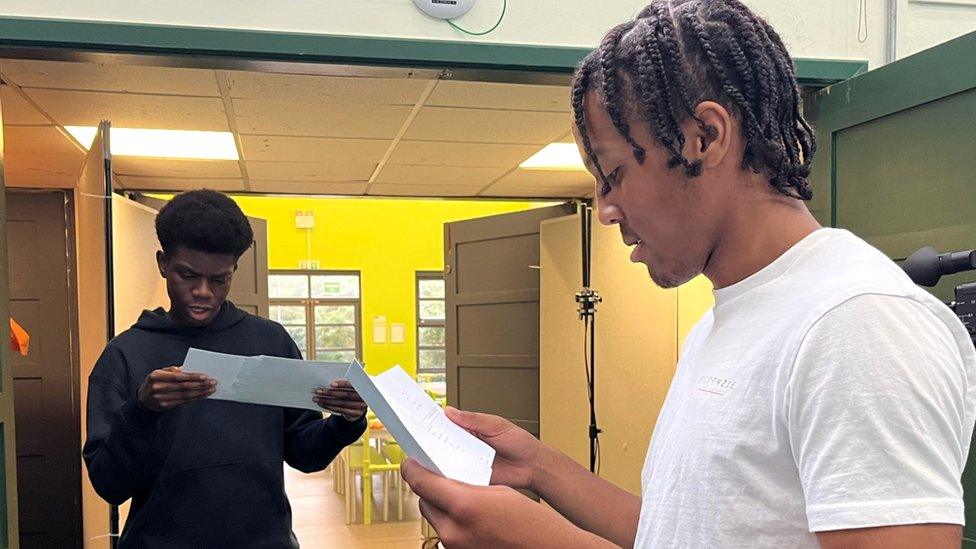
Tens of thousands more 16-year-olds than last year will need to resit their English and maths GCSE exams.
More than 167,000 students in England received grade 3 or lower on their maths paper, about 21,000 more than in 2022, while 38,000 more, 172,000, failed English language - the highest number in a decade.
Head teachers' unions have said this will put more pressure on colleges.
It comes as the overall number of GCSE passes have fallen for a second year.
One parent, who wishes to remain anonymous, has told BBC News her son performed really well in English, music, art, media and photography, achieving As and Bs, but is devastated as he failed his maths exam despite working incredibly hard and receiving extra tutoring.
Her son, who is autistic and has dyslexia, is a talented musician and film-maker and had planned to take A-levels in film studies and photography and a BTec in music production - but one of these will clash with his maths-resit classes, so he is now having to take different subjects.
"All he can see is the fail - it's torture," she said. "And now he has to spend hours working on a subject he doesn't like and is rubbish at."
In England, students need maths and English GCSEs at grade 4 or above to qualify for further study - although, they can study for resits alongside their new subject choices.
Prime Minister Rishi Sunak wants all pupils in England to study some form of maths until the age of 18 but an education committee earlier this year heard the plan would be challenging to implement.
The Association of Colleges has estimated the extra GCSE resits could mean "additional costs of around £500,000 per week across colleges in England, around £16 million per year".
Senior policy manager Eddie Playfair said grading changes around the Covid pandemic had had a "yo-yo effect" on the numbers of resits, making planning a huge challenge. And colleges needed additional resources to pay for extra teachers and classes.
'Demoralising retakes'
Schools Minister Nick Gibb told BBC One's Breakfast programme the compulsory-resit policy was "terribly important" but did not say whether more money would be available.
Julie McCulloch, of the Association of School and College Leaders, said the extra resits would "put more pressure on sixth forms and colleges" and mean "many students are forced into a series of demoralising retakes where the majority will again fall below the benchmark".
The development of new English and maths qualifications was "badly needed", she added.
Last year, only 20% of those retaking their maths GCSEs passed.
The NAHT school leaders' union also said the current policy needed "urgent change".
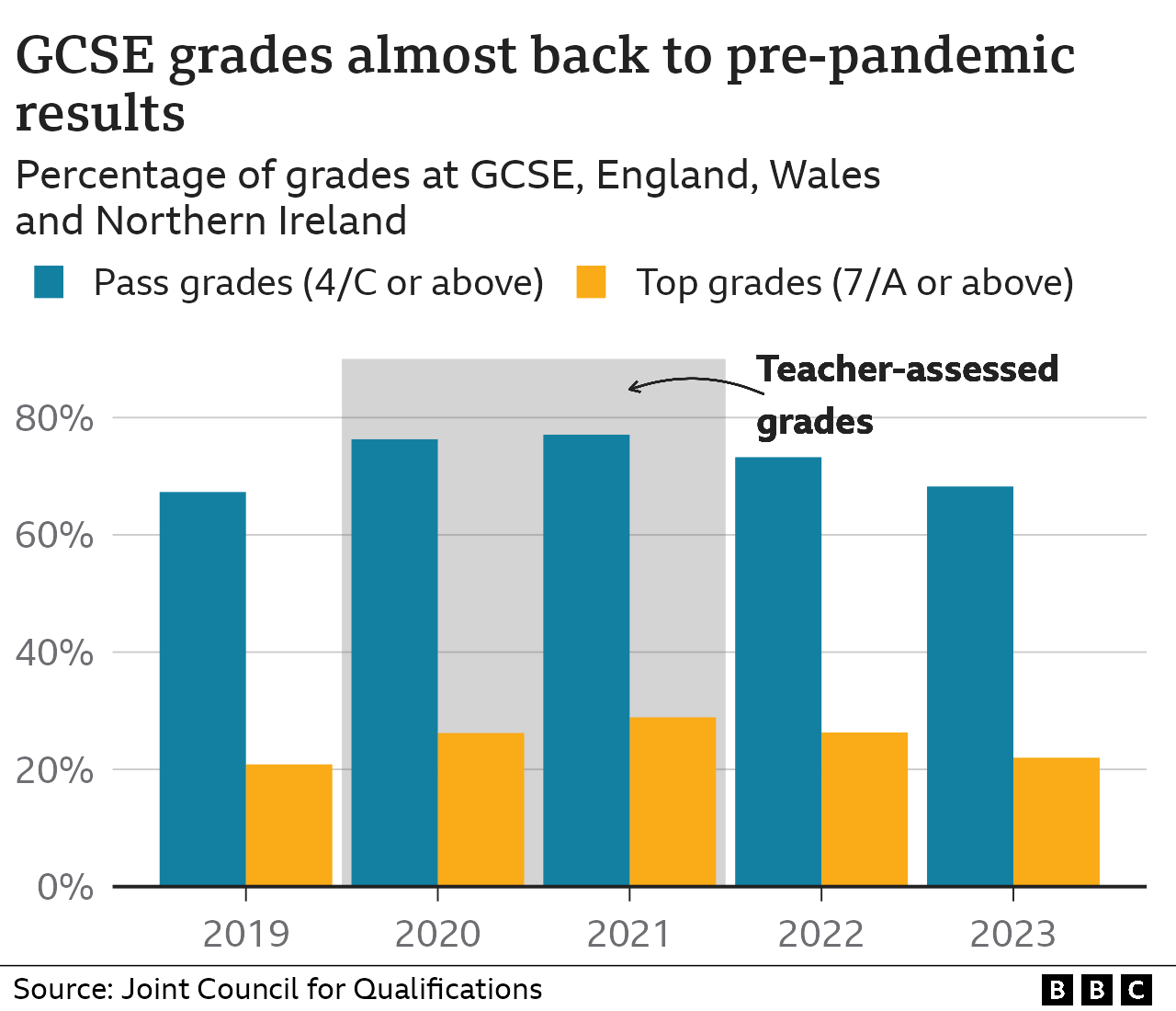
There were more students taking GCSEs this year, but the proportion marked as fails has also risen since 2022.
Overall, GCSE passes in England, Wales and Northern Ireland have fallen - with 68.2% of all entries marked at grades 4/C and above.
The drop has been steepest in England, where grades were due to be brought back in line with 2019 in this year's results.
In Wales and Northern Ireland, grades were always meant to be a bit higher this year.
More than 225,000 Level 2 BTec results were given out on Thursday, and more than 120,000 students received Cambridge National results.
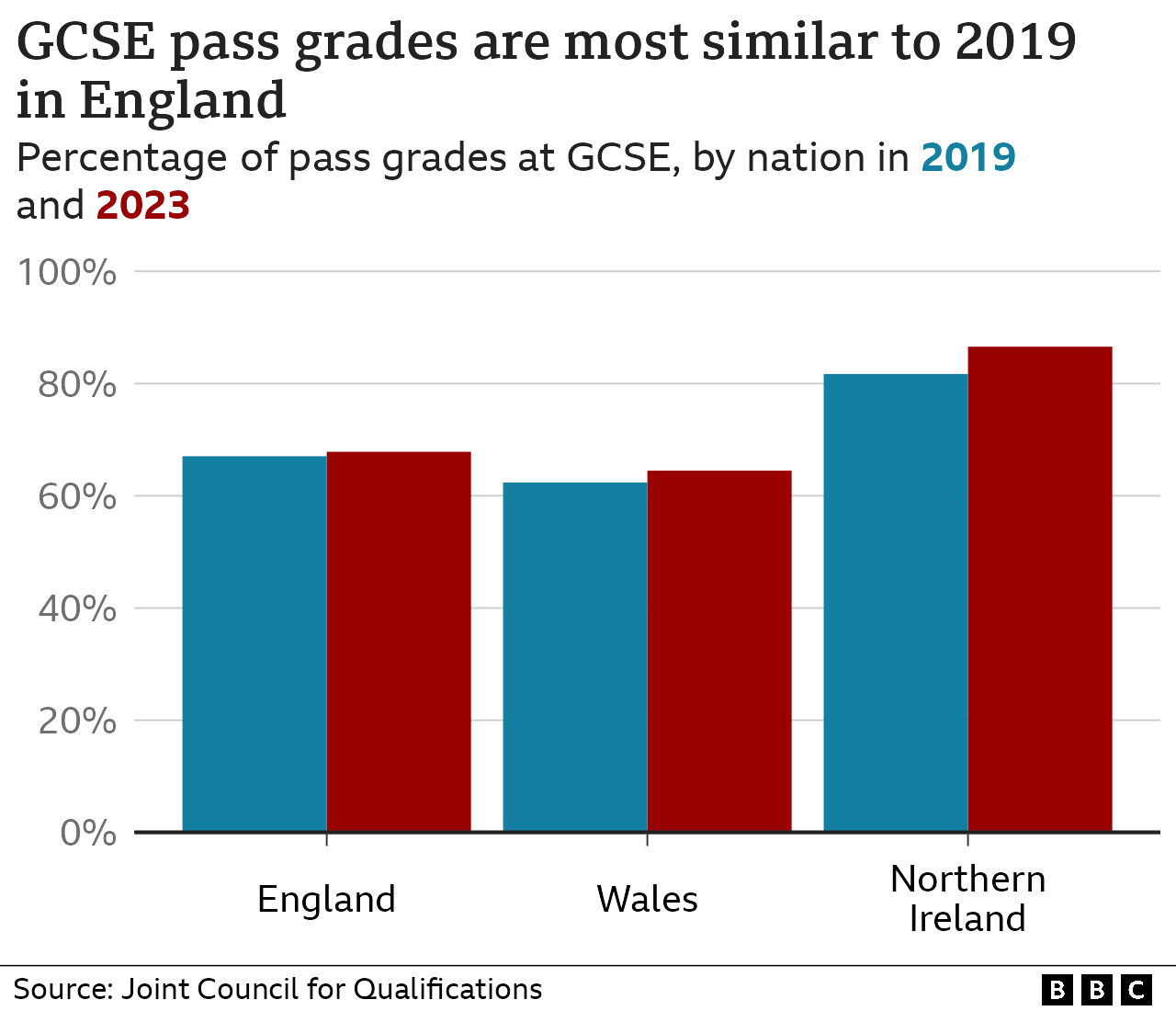
Last year was the first time students sat exams since the start of the pandemic. Ofqual called it a "transition year", with grades set to reflect a midway point between 2019 and 2021. About 73.2% of GCSEs in England, Wales and Northern Ireland were marked at grades 4/C and above.
Now, in the second stage of the plan, grades are more similar to those in 2019, when 67.3% of GCSEs were marked as passes.
Nick Gibb has previously said bringing them back down would ensure results carried "weight and credibility" with employers, universities and colleges, so they know what the different grades mean.
He also said the difference in grades between advantaged and disadvantaged pupils was a "major concern" for the government.
Your device may not support this visualisation
In England, the gap between the regions with the lowest and highest proportion of GCSE passes grew, and state schools had a steeper fall in passes than private schools.
Labour's shadow schools minister Stephen Morgan said the results showed that "the government's levelling up agenda has failed".
Most of this year's GCSE students were in Year 8 when the pandemic hit. They also faced disruption from teacher strikes this year, although unions said they tried to minimise the impact on exam year groups.
Ofqual says there was "protection built into the grading process" so that students should have achieved the grades they would have done if the pandemic had not happened - even if they did not perform as well in their exams.
Some Covid measures also remained in place for this year's exams. GCSE papers in the same subject were spaced apart more than they were before the pandemic, allowing for rest and revision.
Students had formulae and equation sheets in some subjects, and were not tested on unfamiliar vocabulary in modern foreign language exams.
But, unlike in the rest of the UK, GCSE students in England were not given advance information about the topics on which they would be tested.
Students in England have to do some form of study or training until they are 18 - such as A-levels,T-levels, BTecs or apprenticeships.
Last week, the overall percentage of top A-level grades fell close to pre-pandemic levels.
A total of 3,448 people received T-level results - although 5,210 students started them in 2021.
The Department for Education said it was working to "improve retention".

Are you affected by the issues raised in this story? You can get in touch by emailing haveyoursay@bbc.co.uk, external.
Please include a contact number if you are willing to speak to a BBC journalist. You can also get in touch in the following ways:
WhatsApp: +44 7756 165803
Tweet: @BBC_HaveYourSay, external
Please read our terms & conditions and privacy policy
If you are reading this page and can't see the form you will need to visit the mobile version of the BBC website to submit your question or comment or you can email us at HaveYourSay@bbc.co.uk, external. Please include your name, age and location with any submission.
- Published24 August 2023
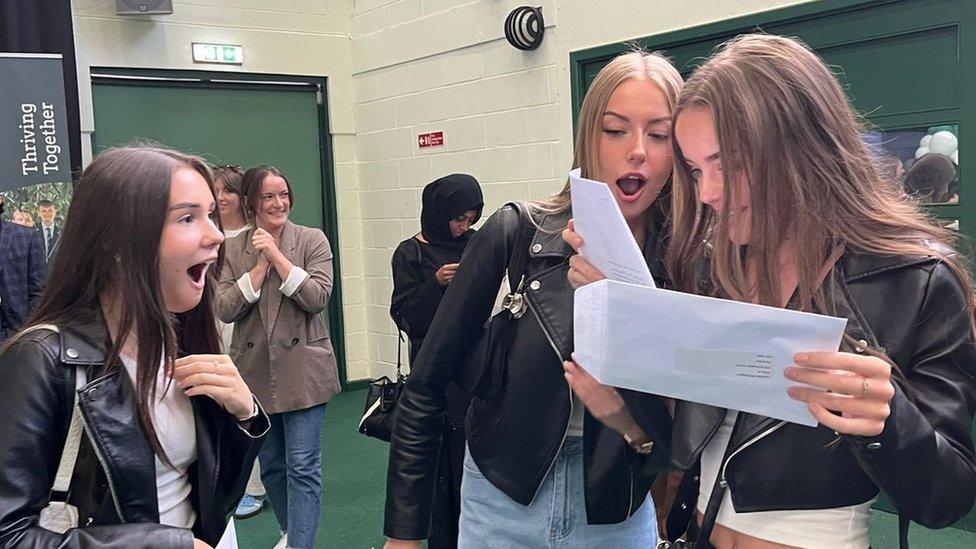
- Published24 August 2023
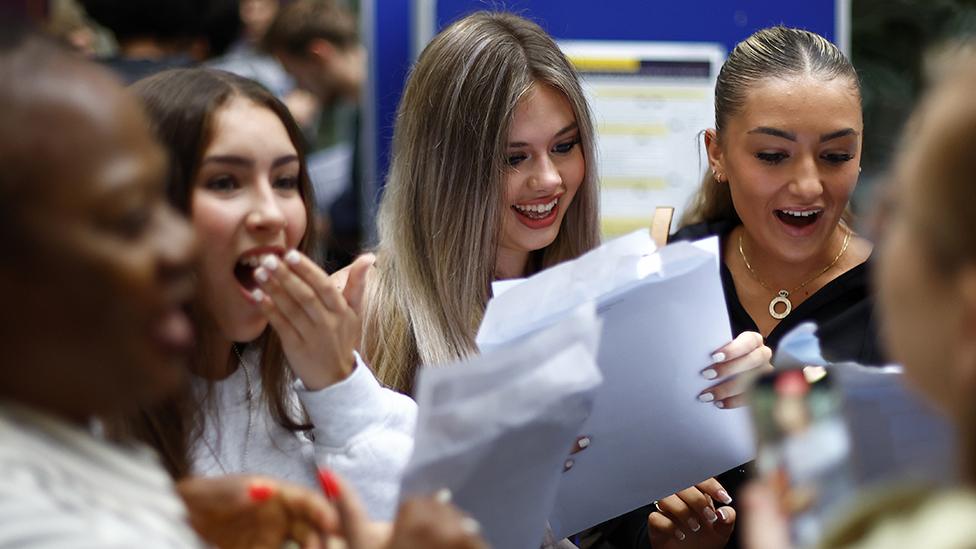
- Published17 August 2023
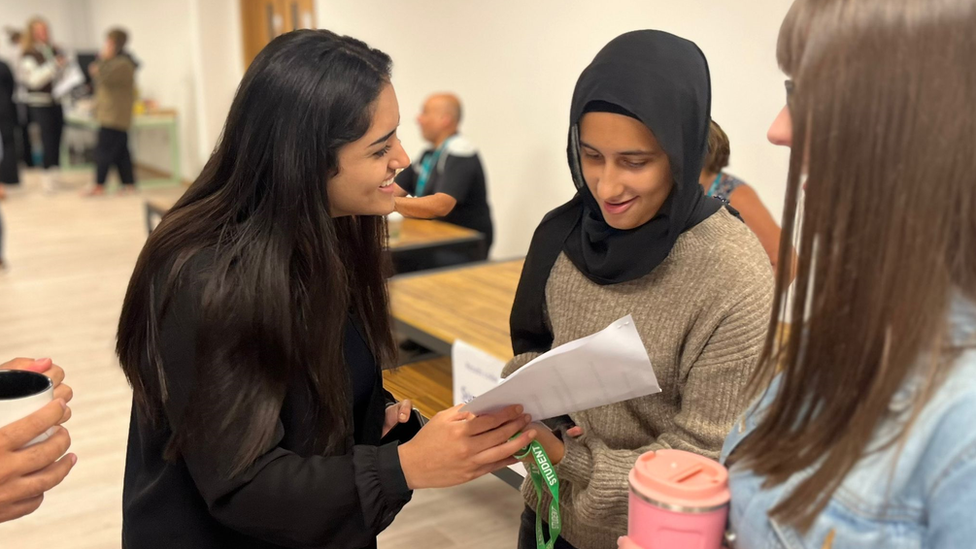
- Published2 days ago
- Published8 August 2023
